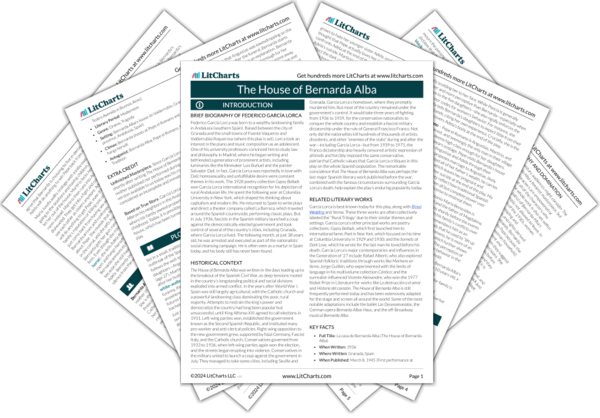Embroidery represents not just women’s traditional role in the honor code governing Spanish village life, but also the collapse of this code as those roles start to shift in modern times. Customarily, upper-class men in a village like Bernarda’s spend their lives breeding horses and overseeing their farm estates, while women stay inside, embroidering, having children, and keeping up with the news on family and neighbors. (Because of their class, Bernarda and her daughters don’t have to cook, clean, or raise their children—they have servants for that.) Thus, while embroidering represents the pinnacle of feminine refinement according to tradition, in this play, it also comes to stand for how tradition renders them powerless and irrelevant.
Traditionally, as part of a wedding dowry, women would offer an ajuar—a collection of embroidered linens and furnishings for their new home. Bernarda orders her daughters to spend their eight years of mourning embroidering, and at the beginning of Act 2, Magdalena is helping embroider sheets for her sisters’ ajuares. But since the play makes it clear that none of them will likely ever marry—at least not if they stay in their village—it also becomes apparent that their embroidery is an act of folly. The women’s embroidery is evidence of how Bernarda wants her daughters to waste their lives in pursuit of an outmoded value system.
Embroidery Quotes in The House of Bernarda Alba
MAGDALENA: Neither mine nor yours. I know I’m not going to get married. I'd rather carry sacks to the mill. Anything but sit in this dark room, day after day!
BERNARDA: That’s what it means to be a woman.
MAGDALENA: To hell with being a woman!
BERNARDA: Here you do what I tell you to do! You can't run to your father with your stories anymore. A needle and thread for females; a mule and a whip for males. That’s how it is for people born with means.










